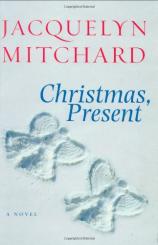Reading Group Guide
Discussion Questions
Christmas, Present

It's a question we often pose to each other to start a theoretical discussion, but for Laura Banner, her last hours on earth are suddenly a very clear and shocking reality in Jacquelyn Mitchard's poignant novel. What does Laura do? How do her husband and family cope? This family faces an unbearable loss with no warning, and they each react with shock, anger, grief, confusion, and even humor as Laura gradually leaves them. Elliot, who began the evening celebrating his 14th wedding anniversary with Laura, must now imagine life without her. He must face his own grief while helping his wife to make lists, write cards for weddings she'll never attend, and say goodbye to their three daughters. He also finds a connection with Laura's mother, a difficult person who reveals something of her heart to him. Laura's siblings and her children each have their versions of love to communicate before it's too late.
What does death do to relationships, and what does it leave in its aftermath? Mitchard asks this question with an accurate, compassionate, and very human eye for detail. And this is ultimately an uplifting story about the strength and flexibility of love. Mitchard's characters are drawn with great honesty, and as they struggle through the worst night they've ever known, they reveal unsuspected strengths and weaknesses to each other; they begin to tell each other the truth of who they are.
1. Laura is given the shock of knowing that she has only hours to live. What do you think about the way in which she chooses to spend those hours? Although Laura's death is sudden and tragic, she is given the opportunity to see it coming, and to prepare herself. Can you imagine what you might do in her position?
2. The title of this book can be read in two ways. First, it is about the present moment, and about members of a family being present with each other in a crisis. Can you also see ways in which each character receives a "Christmas present?" What gifts do they give each other? What is Laura's gift to each of her loved ones? What gift does Laura receive?
3. Almost all of the characters in this story come to see each other differently because of Laura's death. Losing Laura seems to allow them to be more honest with each other than they've ever been before. Do you think siblings, and parents and children, tend to cast each other in rigid roles? Why is it so hard for these people, who love each other, to see each other accurately?
4. A lot of the power of this story comes from its honest revelations about the parent-child relationship. How did you feel about the character of Miranda, Laura's mother? Why do you think Elliot is so angry with her? Do you think she was a bad mother? Did you change your opinion of her by the end of the novel?
5. Were you surprised by Laura's revelation of her "momentary lapse" with the young man who sketched her portrait? Laura doesn't seem to feel that her brief adventure with the young man was wrong or a mistake, do you?
6. How does the author show, through the Laura's daughters, different ways that children cope with loss? Do the adults cope with this loss very differently than the children do?
7. What are some of the details in the story that make Elliot more human, more complex? He has just lost his mother, and now he is losing his wife. Do you see a connection in his relationship to these two women? Do you believe that people tend to seek out aspects of their parents in marriage partners?
8. Dr. Campanile tells Laura that she has lived a "complete life," even though she is dying young. He seems to envy her in some ways. Does it seem to you that Laura's life has been fully lived? Does she have regrets? What compromises has she made? How does her death cause those around her to review their own life choices?
9. Mitchard's style interweaves moments of memory and imagination -- past and future -- constantly. How does this work to make us feel the presence of time and lived experience in this novel? How do both the past and future play a part in what happens in this Boston hospital room, in a 24-hour period? What do these moments allow you, as a reader, to see about Laura and Elliot's lives that they themselves perhaps cannot see?
10. What do you think Paris represents in this story? Why do you think the author chose this setting -- the Eiffel Tower -- for a new woman, a woman with the same name as his mother, to come into the lives of Elliot and his daughters?
11. One of the things that concerns Laura as her death approaches is money. Rory is afraid that the family will have to move, and then elated to find that they will be well off because of the insurance policy. Miranda questions Elliot about his financial situation also. He feels that this is inappropriate. Did you? How would this story have been different if Laura had not convinced Elliot to take out that insurance policy?
Christmas, Present
- Publication Date: November 1, 2003
- Genres: Fiction
- Hardcover: 144 pages
- Publisher: HarperCollins
- ISBN-10: 0060565578
- ISBN-13: 9780060565572








